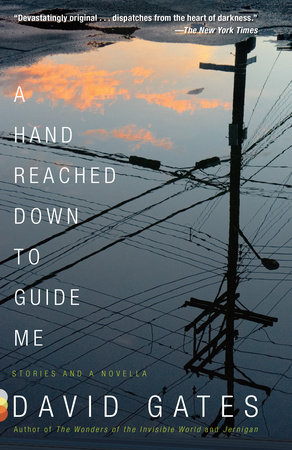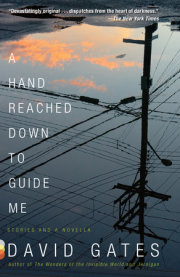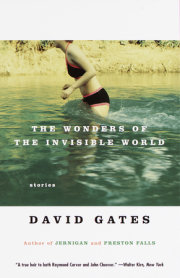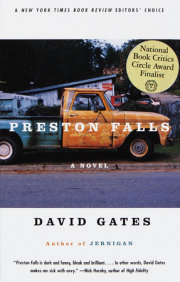The day after we’d had dinner, he called me at the paper, to thank me and my young man for coming out with him, then waited a week to call again. He happened to be on his way north from the city, and did I have time for a quick drink? I could hear my husband typing in the next cubicle. “That sounds fine,” I said.
“Wonderful. You’re welcome to bring your young man along, but I don’t think he likes me much.”
“Right,” I said. “That’s probably not necessary.”
“Even better then. Five thirty too early for you?”
“I don’t think so.”
“And what’s a good place? I don’t really know this town.”
The typing stopped. “It’s hard to say just now.”
“Surely there must be—ah. God, I’m a little slow today. You’re not alone.”
“Exactly.”
“Okay, let me think. I passed an Applebee’s coming in on Route Nine. You know where it is? We can go someplace from there.”
“Right,” I said. “Well, thanks.”
“Copy desk giving you shit?” my husband said.
“No, just something I needed to find out about.”
“It was that guy.”
“For Christ’s sake,” I said. “Is that why you’ve been so weird?”
“I was going to ask you the same thing.”
“This is too stupid to even discuss,” I said. “Anyway—” I nodded
over at the editor, who was talking on the phone.
“Then what time are you coming home?” he said.
“Not late,” I said. “I was supposed to meet somebody for a quick
drink. Probably seven, seven thirty? We could order in and maybe have a little date night after.”
“Who are you meeting?”
“Andrea,” I said. As soon as I said it, I realized it would have been more in character for me to resent being questioned. “I used to work with her at Newsweek? She’s taking the train up.”
“Mind if I come along?”
“It’s going to be a lot of girl talk. But sure, if you want.” Worst case, I could get away and call the man, then take my husband to a bar and keep checking my watch. Andrea’s such a flake—that’s what I’d say. How could he not believe in Andrea?
“No, on second thought I think I’ll bag it.”
“You weren’t testing me, were you?”
“What would be the use?” he said.
The man was waiting outside the Applebee’s in his truck, his window down, reading the Times. I’d put on a halter top that morning—it was such a hot day, and I hadn’t thought I’d have to see anybody. Now I wished I’d had time to drive home and change. “Let’s just go here,” I said. “I shouldn’t stay long.”
“I suppose their liquor’s the same as anybody else’s,” he said. “You’ll have to provide the ambience.” He opened his door, stood up on tip- toes and stretched his arms over his head. His T-shirt came up and exposed an inch of still-lean waistline, which might have been the idea. “It’s certainly the last place anybody’d come looking for you.”
“My husband doesn’t spy on me. If that’s what you mean.”
“No, I can’t imagine your putting up with that. Still, a booth might be in order.”
“You’re making this sound like something it isn’t,” I said.
“Good for you,” he said. “You’ve spared us the preliminaries.” He put a palm on my bare shoulder blade. Up to that point, I hadn’t thought I was seriously considering this man. “Suppose we go in and talk about it.”
When the waitress had set down our drinks and moved off, he said, “Since you’re pressed for time—cheers, by the way. It’s obvious that I’ve taken a shine to you, and it’s obvious that I’m much too old, and of course you have your young man—my God, you look like you’ve just been shot. This is much more embarrassing for me.”
“You don’t seem that embarrassed,” I said.
“I’m not, oddly enough. The situation is embarrassing, yes. But basically you’re either going to tell me to go peddle my papers or you’re not. Which should be clarifying. My position is just that I’d like some time with you.”
“That would be difficult,” I said.
“Hmm,” he said. “I’ve heard stronger expressions of outrage.”
“I’ll bet you have.”
“Oh sure, you can typecast me if you want to. You might take it as
a compliment that I’m not trying to sneak up on you. Just one person to another.”
“Except that I’m married.”
“As was I.”
“And I love my husband.”
“I’d think the worse of you if you didn’t. I’m not trying to make your
life any harder.” He picked up the glossy menu, with color photos of steaks. “God, this place is what hell’s going to be like.”
“Why would you think my life is hard?” I said.
“ ‘Getting through the day’? Isn’t that what you said? Sounds like joy unbounded.”
“So what would we do? If I could spend time with you? Apparently you’re good at sitting around and drinking.”
“Not much escapes you, does it?” he said. “I was thinking that what we did would be entirely up to us. We could start out just being kind to each other.”
Copyright © 2015 by David Gates. All rights reserved. No part of this excerpt may be reproduced or reprinted without permission in writing from the publisher.

































































































